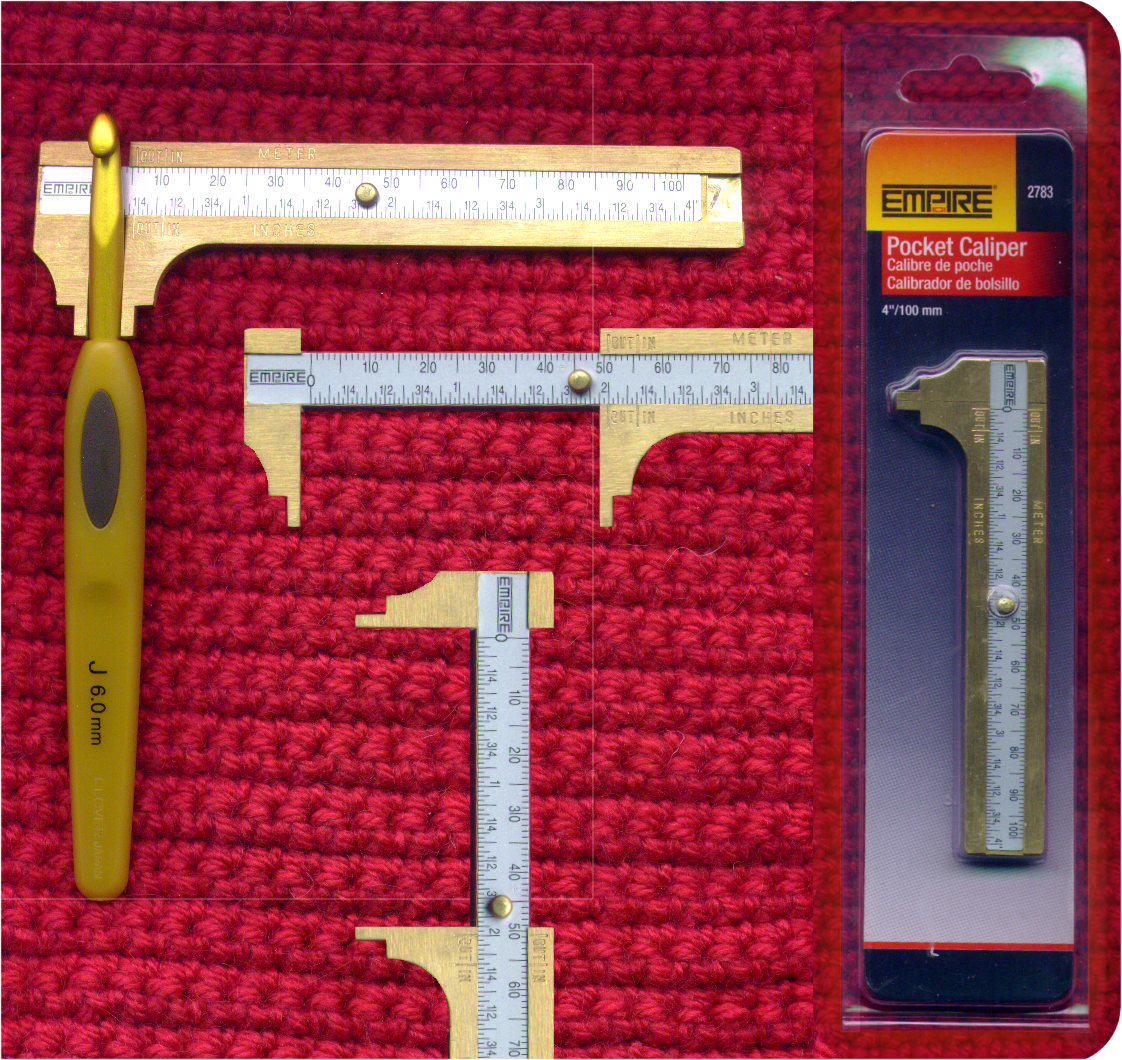Calipers are a measuring tool which I find indispensable for measuring Aluminum and Plastic and Wood Crochet Hooks and Knit Needles. That is why I love these little 4 inch,
Brass Calipers

click for larger image
It is my experience that most of the “4 inch” (which have an overall length of about 4.5 inches) will fit into most any “tool kit” even one as compact as Clover Knit YARN Mate has enough room to include this and a few other “Hooking Necessities“.
For many reasons, none of the handy dandy devices measuring Knitting Needles really work well for Crochet hooks and all to often “stop” at the most common sizes at either end of the size range.
This particularly true for those of use who prefer the type of Crochet hook end found on Clover & Pony Hooks (slightly larger diameter than the barrel).
Obviously you cannot get an accurate measurement of the shaft’s diameter, using the little devices sold for knitting, because you have to be able to get the end thru. If the head of your hook is larger than the hole (unlike knitting needles with tapered points) it just does not work.
Nor, can you use the existing knitting measuring devices for our Double Ended tools, never mind needed into know estoreric details like the Diameter of Grant’s One Needle Looper vs, the K-Tel Knitter or the various sizes of Locker Hooks
For a designer, who needs to include accurate “gauge using x size hook and such and so yarn”
Add to that my need to have the enlarged handles such as Clover’s Soft Touch – so you can’t just poke the butt end thru… well you get the idea.
At just over 4.5 inch long, they easily fit into your pocket or hook pouch and at $7.99 (Sears) to $16 (Duluth Trading) or on average in your local Bead Shop – $11 – they are a worthwhile investment.
Okay too much for the occasional need to measure a Crochet Hook or Knit Needle? but what about gauge? As you can see in the picture, it is really easy to lay the caliper open as much as four inches (although I suggest no more than three and usually am happy with 2 inches) to check your gauge stitches or rows per inch and inch or two to quickly determine wraps per inch for weaving.
Just one small caveat – these are accurate to 1mm, and you can, with practice “eyeball” to .5mm, but I do not recommend using this device to accurately measure your steel hooks under 1mm or any hooks over 1mm to less than .5mm (ie, easy to see 3.5, hard to see 3.75 and certainly no way to be sure of 2.25 vs 2.3) When I need to measure those, either I just hand the box over to the inhouse engineer and his fancy dancy electronic caliper or I use a round wire measuring tool.
or, if you require tools that can measure that small for jewelry purposes I would ask at a reputable jeweler’s supply like the folks at Metalliferious in NYC.
I also find these very useful when making changes to a flat pattern – but that may be because they are there
Hope This Helps
Wheat
P.S. Yes there are cheaper plastic Calipers sold in craft and hobby stores. I was so dissatisfied with their quality and accuracy that I trashed them and consider it dollars down the tubes.
Added 8/23: I am told the quality has improved, so will be looking into these less expensive – small plastic versions.
P.S. Jr, I “reduced so it would fit” the picture of the “still in the package” calipers so you would know what to look for in Sears or woodworking stores (or the tool box of someone who might not miss them immediately if you are discreet about their appropriation for better use)

Added 8/23:
I am told the quality of the plastics have improved, so will be looking into these less expensive versions.
Hi Wheat, haha, just stumbled into this tool section while poking around. Found this bit on using calipers… DH has been busy measuring the Tulip Etimo hooks comparing them to my older steel hooks this afternoon. Thanks for your info, we’ve used them all around the house for years, makes measuring everything so much easier. Wonderful for checking gauge, too.